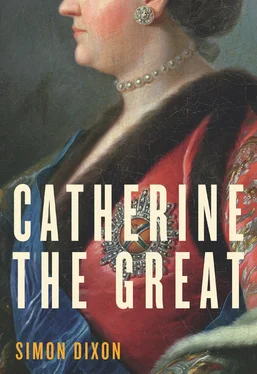Stroganov had plenty of time to spend with the empress and her son because his marriage to Anna Vorontsova had fallen apart by the summer of 1765. Their wedding seven years earlier had been sandwiched in between those of Count Buturlin and Lev Naryshkin. According to Catherine, Kirill Razumovsky made a bet with the Danish ambassador as to which of the three grooms would be cuckolded first, and it turned out to be Stroganov, ‘whose new wife seemed at the time the ugliest, the most innocent, and the most childish’. 65By spring 1766, as the British ambassador reported, both partners desired a divorce with equal zeal, ‘the only thing in which, it is said, they ever agreed in’. 66Yet as Catherine had already explained to Count Mikhail Vorontsov, this was a matter over which she had no control:
From your letter of 14 November, I have seen your request about the divorce of your daughter from her husband, to which I can make no other reply than to say that I am very sorry about your considerable domestic sadness over the differences between your daughter and son-in-law; however, divorce does not depend on me, but is solely an ecclesiastical matter, in which I cannot and will not intervene. Count Stroganov sent me a similar request a month ago, but I ordered it to be given back to him with the message that I cannot intervene in this affair because it is spiritual and there are established channels for such a case; secondly, in the absence of his wife and your daughter [who were then abroad], there can be no resolution; and third, I hesitate even more to intervene in this case because of the close relationship between the Counts Skavronsky and my late grandmother of blessed memory, Catherine I. 67
Only his wife’s death could release Stroganov from his misery. It came in 1768, but not before she had caused him further embarrassment by embarking on an open affair with Nikita Panin. Though it had amused Panin to make fun of his friend’s marital problems over lunch with Grand Duke Paul, he was disconcerted to find himself the butt of jokes by a public which, as Sir George Macartney remarked, could ‘scarce pardon an undisguised boyish passion, in a man of his years, station and experience’. 68
Not even a failed marriage could dull Stroganov’s natural wit: as Catherine’s regular ‘carver’ on state occasions, he had stood behind her chair at the fateful banquet when Peter III denounced her as a fool, comforting her with ‘the witty banter of which he was such a master’. 69However, the real life and soul of the empress’s inner circle was Lev Naryshkin. Though his presence at the empress’s side doubtless helped to reinforce his family’s grip on senior appointments, Lev Aleksandrovich himself played no overt part in either government or the administration of the Court. It became a running joke that he had been made Master of the Horse because he was so rarely to be seen in the saddle (‘We must mount him on a donkey,’ Catherine quipped). 70Critics dismissed him as a gadfly—‘a quite intelligent man’, as Prince Shcherbatov put it, ‘but with the sort of mind that never concentrates, greedy for honours and gain, prone to every luxury, a joker, and, in a word, from his behaviour and his love of joking, more fit to be a court-jester than a grandee’. 71Yet these were precisely the qualities that Catherine had loved and admired since Naryshkin first lit up the Young Court in the dark years of Elizabeth’s reign. Sir Charles Hanbury-Williams had liked him then for his ‘good heart and quick understanding’. To Catherine, he was simply ‘the most trustworthy person I have among this nation’. 72As she put it in her memoirs:
He was one of the most singular personages that I have known, and no one ever made me laugh as much. He was a born Harlequin, and had he been of different birth, he could have made a living and a lot of money from his genuinely comic talents. He lacked for nothing in qualities of mind, he had heard tell of everything, and it was all uniquely arranged in his head. He was capable of discoursing on whatever art or science one might wish. He used the relevant technical terms and spoke to you continuously for a quarter hour or more, and when he stopped, neither he nor anyone else could make anything of the stream of words that had flowed from his mouth, and everyone ended up bursting with laughter. 73
‘No serious person could resist him’, she said, particularly on the subject of politics. Perhaps only such an accomplished jester could have managed the tightrope act of remaining equally trusted by Peter III and his consort, right down to the very day of Catherine’s coup.
Observing that the empress’s life was ‘a mixture of trifling amusements and intense application to business’, Buckinghamshire singled out Countess Bruce as the leading lady in Catherine’s ‘private party’. Even in her thirties, she remained ‘the first ornament of the circle’:
She dresses well, dances tolerably, speaks French with fluency and elegance, has read a dozen plays and as many brochures , and has naturally a partiality for a nation to whom she is indebted for all her acquired accomplishments. Not averse to gallantry, but discreet in her choice of those she favours, her affections, ever subservient to her judgement and studiously observant of those of her mistress, fix upon an object so connected with the favourite of the hour as must necessarily introduce her to the confidence of the secrets and the society of the pleasures. 74
The amorous adventures of Countess Praskovya Bruce were eventually to be her undoing. In 1779, she was banished from Court when Catherine discovered, long after it had become public knowledge, that the countess had ‘conceived a violent passion’ for her own twenty-four-year-old favourite, Ivan Rimsky-Korsakov. 75But there was no sign of such indiscretions in the 1760s, when the empress could look back on a friendship lasting more than twenty years. As the second daughter of Countess Rumyantseva, Catherine’s first Russian governess in 1744, Praskovya had been introduced to Catherine soon after her arrival in Moscow. They formed an immediate bond. ‘At my request, she often slept in my room, and even in my bed, and then the whole night was spent in romping, dancing and frolics. Sometimes it was nearly morning before we went to bed, so great was the racket we made.’ 76Despite the fact that, like Naryshkin, Praskovya later became attached to Peter III in ‘heart, body and soul’, 77she recovered Catherine’s confidence to the point where ‘of all the Ladies she is the one who comes to me most often’. The empress dedicated her first significant memoir to this trusted female ‘friend, to whom I can say everything without fear of consequences’. 78In a Court shot through with rumour and innuendo, that was no mean tribute.
Praskovya had known about Catherine’s affair with Grigory Orlov from the moment it began in 1761 and the two of them performed regularly in amateur theatricals. 79Although there could be no question of a marriage in the aftermath of the Khitrovo fiasco, Catherine had come to rely on Grigory’s bear-like support, seeing his intellectual limitations not as a defect but rather as an opportunity for her to bring him on. To the astonishment of the foreign ambassadors, she made no attempt to conceal their shared domestic bliss. He occupied rooms above hers at the Winter Palace, connected to the imperial apartments by a private staircase. There was a similar arrangement at the Summer Palace, where Grigory indulged his passion for astronomy in an observatory occasionally visited by Grand Duke Paul. (They missed the eclipse of the sun in August 1765 because it was too cloudy, though Paul’s tutor was no less satisfied with the close-up of the capital’s bell towers afforded by Grigory’s telescope. 80)
Considered alongside the crucial role the Orlovs had played in Catherine’s coup, the widespread eighteenth-century assumption that only a man could hold the reins of power was enough to persuade many foreigners that the empress must be in thrall to her favourite. Nothing could have been further from the truth. Grigory certainly served as an important counterweight to Panin and his acolytes and took an interest in many of Catherine’s initiatives. His appointment as president of the Chancellery of Guardianship of Foreigners, opened on 22 July 1763 as a means of attracting foreigners to make more productive use of the vast Russian lands, was a clear indication of the significance she attached to the scheme. This was a big operation—17,866 potential colonists were dispatched from Lübeck in 1766 alone; the total number of registered arrivals between 1762 and 1775 was 30,623—and Grigory played an active part in the administration. Indeed, he did more than that. While Catherine apparently visited settlers in transit for the Volga in the barracks built for her husband’s Holstein regiments at Oranienbaum, Grigory settled individual colonists at Peter III’s old estate at Ropsha (given to him by the empress in 1764), where Pastor Eisen was commissioned to continue his experiments with peasant land-ownership. 81At his house on Millionnaya, Orlov also hosted meetings of the Free Economic Society, founded in 1765, puffing on his pipe as he listened to learned papers on agronomy. In political terms, he represented Catherine’s most personal link to the Guards regiments who had brought her to the throne. Yet he was not a natural man of intrigue. ‘He is good natur’d, indolent, unaffected, and unassuming,’ Macartney reported in 1767. ‘His sudden elevation has neither made him giddy nor ungrateful; and his present friends are the same satellites which attended his course when he moved in a humbler sphere.’ 82While Catherine showered him with expensive gifts of porcelain, decorated with symbols of their mutual love, he made every attempt to entertain her in the manner to which she had become accustomed. On his name day, 25 January 1766, he threw a ball in her honour at which sixty-seven guests sat down to a banquet accompanied not only by Court choristers, but also by table fireworks in the manner preferred by Peter III. Afterwards Grigory was joined in a comedy by his fellow amateurs. Catherine enjoyed herself so much that she stopped out until two in the morning. 83
Читать дальше












